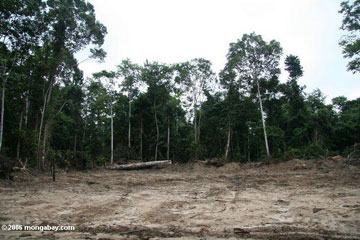|
|
Enacted in 1900 by William F. McKinley the Lacey Act is the oldest wildlife protection law in the US; for a over a century it has protected animals from being illegally hunted and trafficked. An amendment made last year has now extended the law to protect plants for the first time, making it possible for the US to support efforts abroad and at home to combat illegal logging.
According to an article by the International Tropical Timber Organization, any wood that is harvested illegal in its native country now comes under the Lacey Act and “anyone who imported, exported, transported, sold, received, acquired or purchased the wood products made from that illegal timber, who knew or should have known that the wood was illegal, may be prosecuted for violation of the Lacey Act”.
 Logging in the Central African nation of Gabon. Photo by: Rhett A. Butler. |
According to the law, the person or company importing the wood does not have to be in any way involved in the actual act of illegal logging to be held responsible. If they purchased the product knowing they were breaking a law, they can be prosecuted.
All illegally logged wood products are open to seizure. Penalties for breaking this law range from $250 to $500,000 and possible jail time. Depending on its level of enforcement, the law could have widespread impacts for corporate stores selling illegally harvested wood products.
The amendment to the Lacey Act comes at a time when the EU has approved similar measures for combating illegal logging.
Related articles
Illegal timber trade to face tough penalties in the E.U.
(02/18/2009)
Companies dealing in illegal timber may soon face stiff penalties under a proposed E.U. regulation. The European Parliament voted Monday to impose penalties on companies who use or trade illegally sourced timber. National authorities will have the power to impound timber of illegal origin, fine companies, and even shut down particularly egregious violators. Penalties will be “at least five times the value of the timber products” under the proposal, which will be voted on in April at Parliament’s plenary session and then later by EU agriculture ministers.
Wood chemistry used to track origin of timber
(12/18/2008)
A researcher is using carbon and oxygen isotopes to track
the origin of timber as part of a worldwide effort to develop methods
to combat illegal logging.
Indonesia to audit all timber operations to cut illegal logging
(10/17/2008)
The Indonesian Forestry Ministry has announced a policy that requires timber companies to have their wood stocks audited to ensure the wood is derived from sustainably managed forests, reports The Jakarta Post. The measure is expected to curtail illegal logging in a country where a large proportion of timber is of illicit origin.
Corporations become prime driver of deforestation, providing clear target for environmentalists
(08/05/2008)
The major drivers of tropical deforestation have changed in recent decades. According to a forthcoming article, deforestation has shifted from poverty-driven subsistence farming to major corporations razing forests for large-scale projects in mining, logging, oil and gas development, and agriculture. While this change makes many scientists and conservationists uneasy, it may allow for more effective action against deforestation. Rhett A. Butler of Mongabay.com, a leading environmental science website focusing on tropical forests, and William F. Laurance of the Smithsonian Tropical Research Institute in Panama believe that the shift to deforestation by large corporations gives environmentalists and concerned governments a clear, identifiable target that may prove more responsive to environmental concerns.